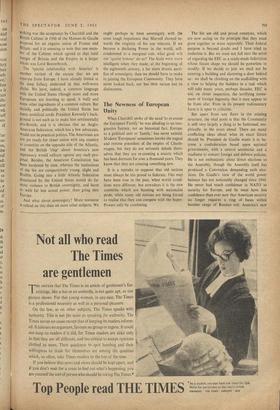Bogus Excuses: Faulty Arguments
Our history books have encouraged us to think of ourselves as weather-beaten explorers, with poetic eyes fixed on far horizons, and of the people of continental Europe as earth-bound troglodytes. Consequently we are apt to feel that it is natural for them to form a common polity, which it would be quite unnatural for us to join. A typical expression of that point of view was Lord Attlee's the other day when he said in Canada that he was not sure he wanted British integration into Europe, because 'Britain was more used to looking outwards and not con- sidering herself part of the Continent' (Times report, Ottawa, May 22). But at least three of the Six have a record of maritime adventure and settlement in other parts of the world which is hardly, if at all, inferior to our own.
It is true that our oceanic trade is very much larger than our trade with Europe, but the Six do not keep their goods to themselves, much as we might wish they did. We are all too con- scious, for instance, of the pressure of German exports in some of our favourite markets, in- cluding Commonwealth markets. But anyway geography, or geopolitics, is a more potent determinant of national self-interest than trade. It was not for commercial reasons that we became involved in war with Germany in 1914 and 1939, but rather that our Governments sensed instinctively that our fate was bound up with that of continental Europe. Even more Striking was the acceptance by Churchill and the British Cabinet in 1940 of the Monnet-de Gaulle Proposal for an organic union of France and Britain; and it is amusing to note that one mem- he' of the Cabinet which agreed to that total merger of Britain and the Empire in a larger Whole was Lord Beaverbrook.
The 'special relationship with America' is another variant of the excuse that we are Separate from Europe. I have already hinted at the deep fallacy enshrined in that well-worn clichd. We have, indeed, a common language With the United States (though more and more Europeans are learning to speak it well) and some other ingredients of a common culture. But socially and politically the United States has many umbilical cords. President Kennedy's back- ground is not such as to make him sentimentally Pro-British; and it is obvious that an Anglo- American federation, which has a few advocates, Would not be practical politics. The Americans are not yet ready for closer union with any country or countries on the opposite side of the Atlantic, and the British 'chip' about America's new supremacy would militate against any such pro- posal. Besides, the American Constitution has been hardened by time. whereas the institutions of the Six are comparatively young, slight and flexible. Going into a little Atlantic federation dominated by the United States would do far more violence to British sovereignty, and leave 1J4 with far less actual power, than going into Europe.
And what about sovereignty? More nonsense iS talked on this than on most other subjects. We ought perhaps to treat sovereignty with the same tough impatience that Marvell showed to- wards the virginity of his coy mistress. If we become a declining Power in the world, self- condemned to a marginal role, what good will our 'quaint honour' do us? The Scots were more intelligent when they made, at the beginning of the eighteenth century, a far more drastic sacri- fice of sovereignty than we should have to make in joining the European Community. They have never looked back, nor has their nation lost its distinctness.











































 Previous page
Previous page